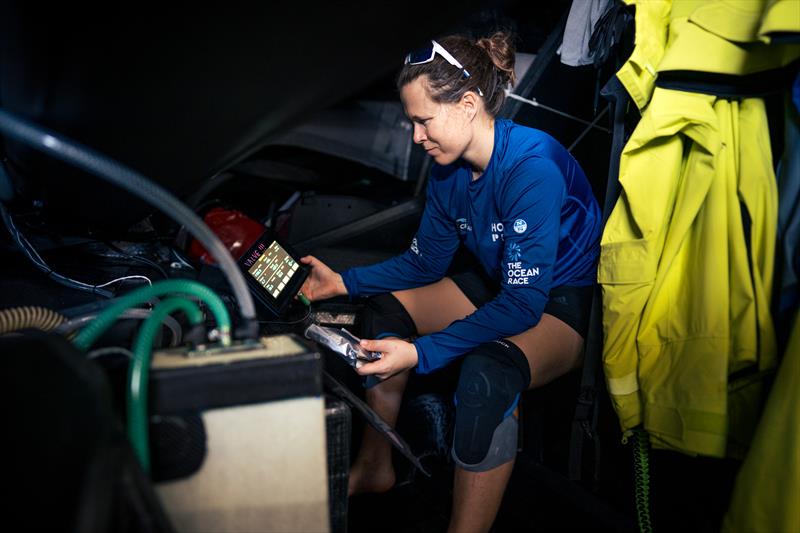
Ocean microplastics found to be rife by teams sailing around the world
by The Ocean Race 1 Jun 2023 23:59 PDT

The Ocean Race 2022-23. 4 February 2023, Leg 2, Day 11 onboard Holcim - PRB Team. OBR, Georgia Schofield, is also in charge of the science unit measuring micro plastics in the oceans © Georgia Schofield | polaRYSE / Holcim - PRB
- Up to nearly 1,900 microplastics per cubic metre (pm3)* of water have been found in samples collected by teams during the initial legs of The Ocean Race
- A new interactive tool for exploring the data has just launched: theoceanracescience.com
Preliminary results from the initial legs of the current edition of The Ocean Race show microplastics in each one of the 40 samples analysed so far, with as many as 1,884 microplastics per cubic metre (pm3)* of water in some locations.
Samples analysed from leg two of the round-the-world sailing Race, from Mindelo, Cabo Verde to Cape Town, South Africa, found microplastic concentrations ranging from 92 to 1,884 particles pm3. The samples of microplastics were of similar levels to the samples collected during leg three, the longest leg in the Race's 50 year history, a 12,750 nautical mile journey through the Southern Ocean. Despite being one of the most remote parts of the planet, 160 - 1,492 particles pm3 were found in samples collected during this section of the Race, between Cape Town and Itajaí, Brazil.
Microplastics are being collected throughout the 60,000km race, using an onboard Sampling Unit: a special filter system designed to collect plastic particles (between 0.03mm and 5mm), which is carried onboard by two teams - GUYOT environnement - Team Europe and Team Holcim - PRB. The unit works by drawing water in and through a filter over a two hour period to capture the microplastics. New samples are taken each day by the sailors and, after each leg, are provided to the National Oceanography Centre (NOC) in the UK for analysis, with support from the University of Rhode Island, USA. NOC recently became a Scientific Collaborator of The Ocean Race, reflecting the two organisations dedication to using the Race's platform to accelerate ocean science.
Victoria Fulfer, visiting scientist from the University of Rhode Island at NOC, said: "It's really concerning that we are finding microplastics in every sample, from coastal areas to the most remote regions of the ocean. Over half of our samples so far have more than 500 microplastic particles per cubic metre that are larger than 0.1 mm, and those concentrations only get higher when we look at even smaller particles. The problem has become pervasive, and sampling efforts like those captured during this race are vital to help us understand the extent of microplastic pollution in the ocean. The samples collected by teams in The Ocean Race are unique because they cover a large spatial range in a short amount of time, giving scientists a sort of "snapshot" of the state of microplastic pollution in the global ocean for 2023."
Measurements were highest closest to urban areas, such as around Cabo Verde and South Africa, and in known "garbage patch" areas where ocean circulation leads particles to accumulate.
Stefan Raimund, Science Lead for The Ocean Race, said: "We are learning more and more about just how pervasive microplastics are in the ocean. They are found in species across the marine environment, from plankton to whales, and we are consuming them ourselves in seafood and even drinking water. Science is the most powerful weapon we have in fighting this issue. The data we gather can help inform and influence business and governments to make the decisions that can better protect our planet.
"We are making all of the data collected by teams during the Race accessible to all, through our new interactive science tool. We'll be adding more information throughout the race so that the science community, Race fans and anyone else who is interested can explore the data and learn more about the health of the ocean."
For the first time in the round-the-world Race, the chemical structure of the plastic particles is also being examined to help grow understanding about which plastic products are entering the ocean and breaking down into microplastics. The most abundant chemical found so far is polyethylene, which is used in many products, including single-use packaging, plastic bags and containers including bottles.
The Ocean Race's science initiative is part of the Racing with Purpose sustainability programme, which was created with Premier Partner 11th Hour Racing. All teams taking part in the competition are involved, carrying a range of equipment that collects data about the impact of human activity on the ocean. 11th Hour Racing Team and Team Malizia carry an OceanPack to capture data about climate change and the ocean, while Biotherm are gathering information on ocean biodiversity.
The results from this edition of the Race, which started in Alicante, Spain on 15th January 2023 and will finish in Genova, Italy, the Grand Finale, at the end of June, are significantly higher compared with the microplastic data captured during the last edition in 2017-18. During the previous edition samples ranged from 50-100 pm3 with levels thought to be up to 18 times higher this time around because of an increase in microplastic pollution and improvements in the analysis methods and technology. This edition is also analysing microplastic fibres - which are incredibly prevalent - while the 2017-18 edition didn't test for them.
The Ocean Race is contributing scientific data to the Ocean Decade Odyssey project, which is an endorsed Project of the a target="_blank" href="https://oceandecade.org/">UN Decade of Ocean Science for Sustainable Develoment (2021-2030) supporting efforts to reverse the cycle of decline in ocean health and create improved conditions for sustainable development of the ocean.
Head to theoceanracescience.com to discover more.
*Initial results have analysed plastic particles between 0.1mm - 5mm. Deeper analysis, examining particles as small as 0.03mm will be published following the Race.